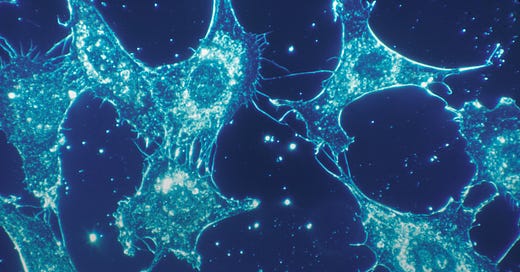The cell. We all learn about cells in high school biology. Their structure, their parts, and of course the mitochondria that is now a millennial meme. But if you’re not a cellular biologist, there is an entire universe of the unknown lurking in our cells and their emergent properties as communities and systems. The cell is so much more than what we’ve been taught.
And who better to open the door to this magnificence universe than expert science writer, Siddhartha Mukherjee in his latest, The Song of The Cell: An Exploration of Medicine and the New Human, where he takes readers of a journey from the discovery of cells to the cutting edge of cellular medicine.
As a practicing biologist and oncologist, Mukherjee offers a unique perspective on cellular biology that isn’t limited to the bench. Rather he knows not just of bench experiments but can leverage theory and scientific knowledge to practical applications of treating patients. The phrase in the subtitle of his book, “new human” hints directly at the applications of cellular science to rebuild humans “anew with modified cells”. The ability to treat, repair, and renew with cellular therapy.
The grounding for this grand scientific vision rests on the philosophy of the cell as the unit of disease. Diseases are a manifestation of cellular dysfunction. Which means that cellular therapies are the future of curing disease. Only by understanding how cells work and what they do at an intimate level, can scientists and physicians create targeted therapies and cures for disease. And no one is more familiar with such a perspective than an oncologist.
The Song of The Cell is traditional Mukherjee, mixing history with modern science to tell an engaging story no one else thought to tell. The arc can be seen in the book’s organization into six parts beginning with deep history of discovery, followed by deep dives into cellular function, including specialized sections of blood cells and organs. And he wraps with a section focused on the cutting-edge of science including stem cells and targeting cancer therapies.
I personally liked the latter parts of the book as the future of biotechnology broadly, with cellular therapies included under this umbrella, of great intellectual interest to me. But as someone who had little formal biological training throughout college, the deep dives on cell function, blood, and organ cells were of great interest as well.
Overall, The Song of The Cell was excellent, as expected. The breadth and depth offered by Mukherjee is truly astonishing and impressive. That said, however, I personally enjoyed his previous two book (linked below) a bit more.
Published: October 2022
Publisher: Scribner
Format: Hardcover
If you think this sounds interesting, bookmark these other great reads:
The Gene: An Intimate History by Siddhartha Mukherjee (2016)
The Emperor of All Maladies: A Biography of Cancer by Siddhartha Mukherjee (2010)
The Idea of the Brain: The Past and Future of Neuroscience by Matthew Cobb (2020)
This post contains affiliate links, allowing me to earn a small commission when you purchase books from the link provided. There is no cost to you, and this will allow me to keep this newsletter free and open to all. Happy reading!






